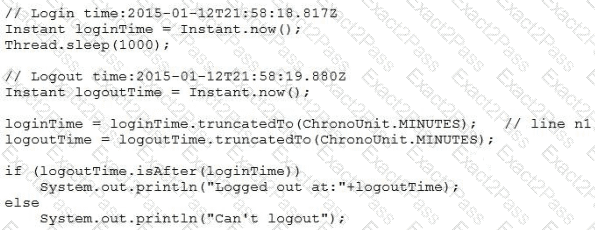Last Update 19 hours ago Total Questions : 208
The Java SE 8 Programmer II content is now fully updated, with all current exam questions added 19 hours ago. Deciding to include 1z0-809 practice exam questions in your study plan goes far beyond basic test preparation.
You'll find that our 1z0-809 exam questions frequently feature detailed scenarios and practical problem-solving exercises that directly mirror industry challenges. Engaging with these 1z0-809 sample sets allows you to effectively manage your time and pace yourself, giving you the ability to finish any Java SE 8 Programmer II practice test comfortably within the allotted time.
Given the code fragments:
class ThreadRunner implements Runnable {
public void run () { System.out.print (“Runnable”) ; }
}
class ThreadCaller implements Callable {
Public String call () throws Exception {return “Callable”; )
}
and
ExecutorService es = Executors.newCachedThreadPool ();
Runnable r1 = new ThreadRunner ();
Callable c1 = new ThreadCaller ();
// line n1
es.shutdown();
Which code fragment can be inserted at line n1 to start r1 and c1 threads?
Given the code fragment:

What is the result?
Given:
class FuelNotAvailException extends Exception { }
class Vehicle {
void ride() throws FuelNotAvailException {//line n1
System.out.println(“Happy Journey!”);
}
}
class SolarVehicle extends Vehicle {
public void ride () throws Exception {//line n2
super ride ();
}
}
and the code fragment:
public static void main (String[] args) throws FuelNotAvailException, Exception {
Vehicle v = new SolarVehicle ();
v.ride();
}
Which modification enables the code fragment to print Happy Journey!?
Which statement is true about the single abstract method of the java.util.function.Function interface?
Given the code fragment:

What is the result?
Given the code fragment:

Which modification enables the code to print Price 5 New Price 4?
Given the code fragments:
public class Book implements Comparator
String name;
double price;
public Book () {}
public Book(String name, double price) {
this.name = name;
this.price = price;
}
public int compare(Book b1, Book b2) {
return b1.name.compareTo(b2.name);
}
public String toString() {
return name + “:” + price;
}
}
and
List
Guide to Java Tour”, 3));
Collections.sort(books, new Book());
System.out.print(books);
What is the result?

